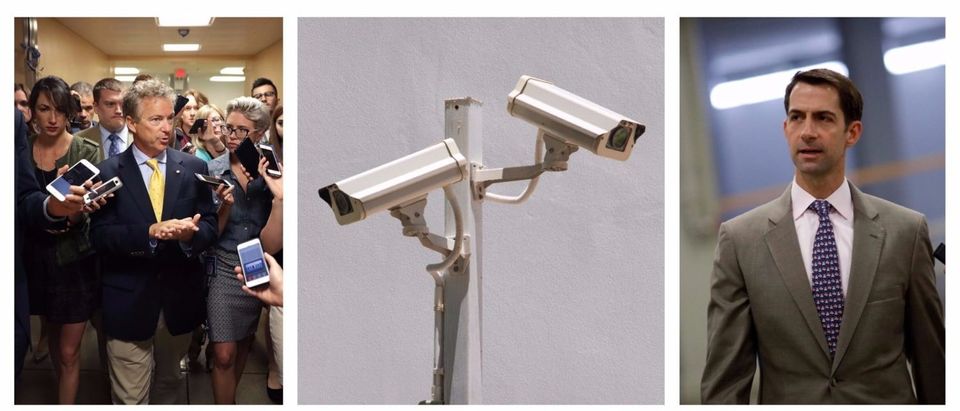The Senate voted Thursday 65 to 34 to reauthorize the Foreign Intelligence Surveillance Act (FISA) — a piece of legislation that was recently set to expire — without significant changes to the government’s surveillance apparatus.
The bill, which passed the House 256-164 last week, extends Section 702 of the FISA program for six years if it is ultimately signed by President Donald Trump.
The specific statute allows federal intelligence agencies to collect data on foreigners suspected of crimes. The broad powers interpreted in the law and the inherent nature of surveillance, however, often cause the electronic communications of law-abiding Americans to be scooped up as well.
The crux of the debate surrounding the legislation was if it needed fundamental reforms in order to safeguard constitutional protections for American citizens, something a bipartisan group of senators have been consistently advocating for.
National security hawks, like Republican Sen. Tom Cotton of Arkansas, argue that FISA and all of its both enumerated and unlisted powers are necessary for the U.S. intelligence agencies to combat crime abroad, particularly terrorism.
Contrarily, privacy-champions like Republican Sen. Rand Paul of Kentucky and Democratic Sen. Ron Wyden of Oregon, argue that it is possible to both ensure the intelligence community (IC) is fully equipped to protect the country from evildoers abroad, while also protecting the foundational principles of the U.S. Constitution. (RELATED: The Battle Over The Government’s Massive Surveillance Powers Has Arrived)
They believe the best way to achieve this balance is by restructuring the law with major reforms, such as changing the “about” collection practice in which communications sometimes entirely among innocent Americans can be swept up if they reference the intended target’s email address.
“I rise in opposition to the government listening to your phone calls, reading your emails or reading your text messages without a warrant,” Paul said on the Senate floor in an impassioned speech to colleagues Tuesday. “It doesn’t mean the government will never do this, but it means they will have to ask a judge. They would have to ask a judge if they have probable cause that you committed a crime.”
Not all of the speakers on the Senate floor Tuesday advocated for more reforms of FISA, and against a, for the most part, clean reauthorization.
“It’s not a perfect bill, but I hardly have worked on a perfect piece of legislation,” Democratic Sen. Mark Warner of Virginia, who is also the vice chair of the Senate Intelligence Committee, said while advocating for the bill. He asserted that its comprehensive enough for the IC, while still making some ostensible concessions.
Warner even turned around during his speech in an attempt to personally address Wyden and his deep-seated concerns.
“We’ve been debating this issue for the past 18 months,” Warner continued. “I believe this bill will strengthen and protect Americans.”
“This is the most reviewed federal program in government,” Republican Sen. Richard Burr of North Carolina said following Warner’s speech.
Wyden requested two more minutes of speaking time on the floor towards the end of the debating session to clarify that a vote to turn down reauthorization would not stop the program from operating, nor imperil the IC’s investigative processes.
Eventually, after a lengthy cloture vote, the final vote was cast. The final vote on six-year reauthorization then had a maximum of 30 hours for further debate.
Originally, the bill was given a sunset for the end of 2018, and lawmakers either scrambled to reinstate the law’s spying programs, or resisted and waited for deep concessions. It was eventually given a temporary reauthorization as the proverbial shot clock was winding down and Congress was ready to leave for its Christmas recess.
But the time of kicking the can down the road ended, and it is now in the hands of Trump, who last week chimed into the debate with some contradictory statements.
With that being said, I have personally directed the fix to the unmasking process since taking office and today’s vote is about foreign surveillance of foreign bad guys on foreign land. We need it! Get smart!
— Donald J. Trump (@realDonaldTrump) January 11, 2018
Trump’s original tweet reflects his apparent apprehensiveness over the surveillance powers, since he and many others believe that lame duck, perhaps rogue, intelligence officials within maybe the FBI or larger Department of Justice, purposefully unmasked key public officials within the Trump administration.
Former national security adviser Michael Flynn’s ties to Russian proxies, for example, were discovered through 702 surveillance mechanisms, after what some say was a deliberate act from Obama administration officials during the transitional period. In a piece titled “Will The GOP Remake Surveillance Laws After Trump Leaks,” The Daily Caller News Foundation explored how the Flynn outing may change the perception of certain legislators’ who almost always side with the wishes of the IC.
Send tips to eric@dailycallernewsfoundation.org.
Freedom of Speech Isn’t Free
The Daily Caller News Foundation is working hard to balance out the biased American media. For as little as $3, you can help us. Make a one-time donation to support the quality, independent journalism of TheDCNF. We’re not dependent on commercial or political support and we do not accept any government funding.
All content created by the Daily Caller News Foundation, an independent and nonpartisan newswire service, is available without charge to any legitimate news publisher that can provide a large audience. All republished articles must include our logo, our reporter’s byline and their DCNF affiliation. For any questions about our guidelines or partnering with us, please contact licensing@dailycallernewsfoundation.org.



